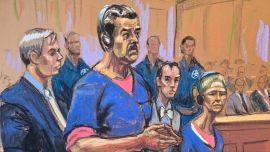As always, there are facts and then there are interpretations. And everything is more complicated – and disputed – because the event turned out to be the biggest and most popular celebration in Argentina’s history.
The caravan of five million people that welcomed Argentina’s world champions home, besides creating some unforgettable postcards, has awakened old grudges between the newly empowered president of the Argentine Football Association (AFA), Claudio ‘Chiqui’ Tapia, and the national government, which could not and did not know how to turn an immense outpouring of collective joy into some much-needed political mileage.
In the midst of the frenzy of celebrations, everything went wrong. The bus did not arrive at the Obelisk, as the champions wanted, and neither was there a salute and offering from the balcony of the Casa Rosada, as the government and part of a society wanted.
It is possible that if the security operation had been designed with the same level of anticipation as the open-top buses, the world champions would have travelled at least a couple of kilometres further. Could anything more have really been done in light of the millions of people who came from all over the city and the Conurbano to celebrate? "It was impossible, but the ministers met only a day before when it was known a week before that this could happen," says one official who was involved in the organisation of the security operation.
On Friday, December 9, after Argentina had defeated the Netherlands in the quarter-finals, when it became clear that winning the World Cup was a real possibility, Tapia and some of his main allies began to consult the players about the different options they were considering. There was a hint of a possible trip to the balcony of the Casa Rosada, it was one of the first ideas that sprang to mind.
The response from the squad was always the same: "We'll see later, but always with the people." Throughout the campaign, Messi and his teammates emphasised their closeness with Argentina’s 47-million-strong support base.
The players wanted to celebrate in the same way as they had been doing after every match in Qatar, some 13,000 kilometres away: with the fans. They wrote as much on their social network accounts and said it in private too, before and after the final against France. It was a way of saying thank you, a closure to this perfect story that they lived for 40 days in Qatar.
For many of this generation of footballers, younger and perhaps without the symbolic or political attachment to what the Rosada’s balcony represents, the sepia-coloured images of Maradona with the World Cup are just an anecdote. Argentina’s social and political rift, which they try to avoid but know perfectly well, has contributed to their decision to distance themselves from that option.
The eventual decision, confirmed on the squad’s flight back to the country, was to get on an open-top bus and say hello to the fans. No-one had imagined the human tide that filled the streets of Buenos Aires and the Conurbano last Tuesday. Arriving at General Paz and Ricchieri, one of the buses was left without the police escort that protected it, setting off alarms in the operation. It was then that Security Minister Aníbal Fernandez called Tapia to tell him that they could not continue on their route and that it was unfeasible to continue with that many people to the Obelisk.
"The first interpretation is that we are fighting with Alberto's government, but in reality ‘El Comandante’ wanted to celebrate without anyone getting in the way," says an influential voice at AFA’s Buenos Aires headquarters at Viamonte 1366. The commander is Tapia, the AFA president stalked by the infrared sight of the Rosada and complaints registered at the the General Inspectorate of Justice (IGJ) throughout 2021.
President Alberto Fernández, who has never supported Tapia’s position as the head of national football, has in these days avoided referring to the old and bad relationship he has had with Tapia since day one. The Pernonist leader previously tried to destabilise Tapia and his position in tandem with television mogul and presenter Marcelo Tinelli on several occasions.
Since those days of silent war and uncertainty about his future, Tapia has distanced himself from Alberto, as well as Tourism & Sports Minister Matías Lammens. His only liaison and support has been Santiago Carreras, Máximo Kirchner's spokesperson in all matters related to football, and Sergio Massa, through his close friend Pablo Toviggino, the treasurer of the home of national football.
Before and after the World Cup final, quarrels had faded away. Several government officials, who were prevented from travelling by direct presidential order, had written to Tapia to make themselves available. Strengthened to the max after lifting the World Cup in Qatar, Tapia remembers how everyone acted previously. During the celebrations, he translated it into tweets that even included emojis – quite a revelation for someone who, for a few days, became the most powerful man in Argentina.
























Comments